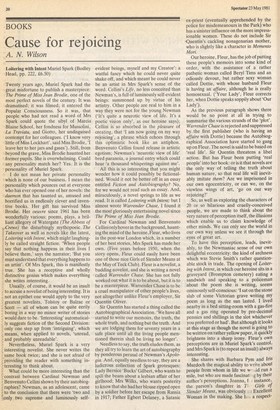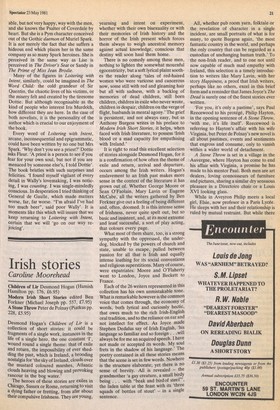Cause for rejoicing
" A. N. Wilson Loitering with Intent Muriel Spark (Bodley Head, pp. 222, £6.50) • Twenty years ago, Muriel Spark had the great misfortune to publish a masterpiece: The Prime of Miss Jean Brodie, one of the most perfect novels of the century. It was .dramatised; it was filmed; it entered the Popular Consciousness. So it was, that people who had not read a word of Mrs Spark could quote the sibyl of Marcia Blaine School, her fondness for Mussolini, La Traviata, and Giotto, her undisguised contempt for her colleagues. CI know very little of Miss Lockhart', said Miss Brodie, 'I leave her to her jars and gases'). Still, from beyond the grave, Miss Brodie haunted her • former pupils. She is overwhelming. Could • any personality match her? Yes. It is the personality of Muriel Spark.
• I do not mean her private personality • which is none of our business. I mean the personality which pounces out at everyone who has ever opened one of her novels: the daemon that has taunted us, amused and horrified us in endlessly clever and inventive books. Her gift has survived Miss Brodie. Her oeuvre since 1961 has been wonderfully various: poems, plays, a brilliant allegory of Watergate (The Abbess of Crewe) the disturbingly mythopoeic The Takeover as well as novels like the latest, Loitering with intent, which might laughingly be called straight fiction. 'When people say that nothing happens in their lives I believe them,' says the narrator; 'But you must understand that everything happens to an artist'. Of Mrs Spark, this is manifestly true. She has a receptive and wholly distinctive genius which makes everything she writes interesting.
Usually, of course, it would be an insult to accuse a novelist of being interesting. It is not an epithet one would apply to the very greatest novelists, Tolstoy or Balzac or Scott — all of whom can be quite eerily boring in a way no minor writer of stories would dare to be. 'Interesting' automatically suggests fiction of the Second Division: only one step up from 'intriguing', which means, when applied to novels, 'unread, and probably unreadable'.
Nevertheless, Muriel Spark is a very interesting novelist. She never writes the same book twice; and she is not afraid of providing the reader with something interesting to think about.
What could be more interesting than the • contrast between Cardinal Newman and Benvenuto Cellini shown by their autobiographies? Newman, as an adolescent, came • to the conclusion that there were 'two and only two supreme and luminously self evident beings, myself and my Creator': a wistful fancy which he could never quite shake off, and which meant he could never be an artist in Mrs Spark's sense of the word. Cellini's Life, no less conceited than Newman's, is full of luminously self-evident beings: summoned up by virtue of his artistry. Other people are real to him in a way they were not for the young Newman ('It's quite a neurotic view of life. It's a poetic vision only', as our heroine says); Cellini is so absorbed in the pleasure of creating, that 'I am now going on my way rejoicing', a phrase which echoes through this optimistic book like an antiphon. Benvenuto Cellini found release in artistic egotism; Newman's 'neurotic view of life' bred paranoia, a journal entry which could hear 'a thousand whisperings against me'.
All this is so interesting that you might wonder how it could possibly be fictionalised. Would it not be better off in an essay entitled Fiction and Autobiography? No, for we would not read such an essay. And, miraculously, a novel springs to life as we read. It is called Loitering with Intent; but I almost wrote Warrender Chase, I found it the most gloriously entertaining novel since The Prime of Miss Jean Brodie.
For Cardinal Newman and Benvenuto Cellini only hover in the background, haunting the mind of the heroine, Fleur, who lives in the post-war London which, in a number of her best stories, Mrs Spark has made her own. (Five years before 1950, when the story opens, Fleur could easily have been one of those nice Girls of Slender Means at the May of Teek Club). Fleur is a novelist, a budding novelist, and she is writing a novel called Warrender Chase. She has not fully worked out what it is to be about, but it is to be a masterpiece. Warrender Chase is to be a cruel manipulator of other people's lives, not altogether unlike Fleur's employer, Sir Quentin Oliver.
Sir Quentin has started a thing called the Autobiographical Association. 'We have all started to write our memoirs, the truth, the whole truth, and nothing but the truth. And we are lodging them for seventy years in a safe place until all the living people mentioned therein shall be living no longer'.
Needless to say, the truth eludes them, as they all try to learn the art of autobiography by ponderous perusal of Newman's Apologia. And, equally needless to say, they are a ludicrous collection of Spark grotesques: Lady Bernice 'Bucks' Gilbert, who wants to spill the beans about a lesbian affair of her girlhood; Mrs Wilks, who wants posterity to know that she had her blouse ripped open by a soldier before her escape from Russia in 1917; Father Egbert Delaney, a Satanic ex-priest (eventually apprehended by the police for misdemeanours in the Park) who has a sinister influence on the more impressionable women. These do not include Sir -Quentin's cackling nonagenarian mother, who is slightly like a character in Memento Mori.
Our heroine, Fleur, has the job of putting these people's memoirs into some kind of order, with the assistance of a rather pathetic woman called Beryl Tims and an odiously devout, but rather sexy woman called Dottie, with whose husband Fleur is having an affaire, although he is really homosexual. (`Your Lady', Fleur corrects her, when Dottie speaks soppily about 'Our Lady').
As the previous paragraph shows there would be no point at all in trying to summarise the various strands of the 'plot'. Warrender Chase is rejected and suppressed by the first publisher (who is having an affaire with Dottie) because the Autobiographical Association have started to gang up on Fleur. The novel is said to be based on 'real life'. Sir Quentin threatens a libel action. But has Fleur been putting 'real people' into her book: or is it that novels are the only way of telling the truth about human nature, so that real life will inevitably imitate them? Are we imprisoned in our own egocentricity, or can we, on the viewless wings of art, `go on our way rejoicing?'
So, as well as exploring the characters of 20 or so hilarious and cruelly-conceived people, we are made to think about the very nature of perception itself, the illusions which enable us to claim knowledge of other minds. We can only see the world in our own way unless we see it through the eyes of great art.
To have this perception, leads, inevitably, to the Newmaniac sense of our own delightful eccentricity: the kind of archness which was Stevie Smith's rather questionable stock in trade. The opening of Loitering with Intent, in which our heroine sits in a graveyard (Brompton cemetery) eating a sandwich and speaking to a policeman about the poem she is writing, seems ominously self-conscious: 'I sat on the stone slab of some Victorian grave writing my poem as long as the sun lasted. I lived nearby in a bed sitting-room with a gas-fire and a gas ring operated by pre-decimal pennies and shillings in the slot whichever you preferred or had'. But although it looks at this stage as though the novel is going to be written on rather yellow paper, it quickly brightens into a sharp irony. Fleur's own perceptions are in Muriel Spark's control, and Mrs Spark is (to repeat an insult) always interesting.
She shares with Barbara Pym and Iris Murdoch the magical ability to write about people from whom in life we w,ld run a mile, but who are made fascinati .1.g by their author's perceptions. Joanna, f instance, the parson's daughter in T1, • Girls of Slender Means, was obviously Excellent Woman in the making. She h.‘, a respect able, but not very happy, way with the men, and she knows the Psalter of Coverdale by heart. But she is a Pym character conceived out of the Gothic daemon of Muriel Spark. It is not merely the fact that she suffers a hideous end which places her in the same company as so many Spark heroines. She is perceived in the same way as Lise is perceived in The Driver's Seat or Sandy in The Prime of Miss Jean Brodie.
Many of the figures in Loitering with Intent, similarly, could be imagined in The Word Child: the cold grandeur of Sir Quentin, the chaotic lives of his victims, or the misery felt and created by the tiresome Dottie. But although recognisable as the kind of people who interest Iris Murdo'ch, how different they are here. In the case of both novelists, it is the personality of the author which is crucial to our enjoyment of the book.
Every word of Loitering with Intent, arcane, inconsequential and epigrammatic, could have been written by no one but Mrs Spark. 'Why don't you see a priest?' Dottie asks Fleur. 'A priest is a person to see if you fear for your own soul, but not if you are menaced by someone else's, I told Dottie'. The book bristles with such surprises and felicities. found myself vigilant of every detail in Wally's lovemaking, I was noticing, I was counting. I was single-mindedly conscious. In desperation I tried thinking of General de Gaulle, which made matters worse, far, far worse. "l'm afraid I've had too much beer", said poor Wally'. It is moments like this which will insure that we keep returning to Loitering with Intent, certain that we will `go on our way rejoicing'.











































 Previous page
Previous page